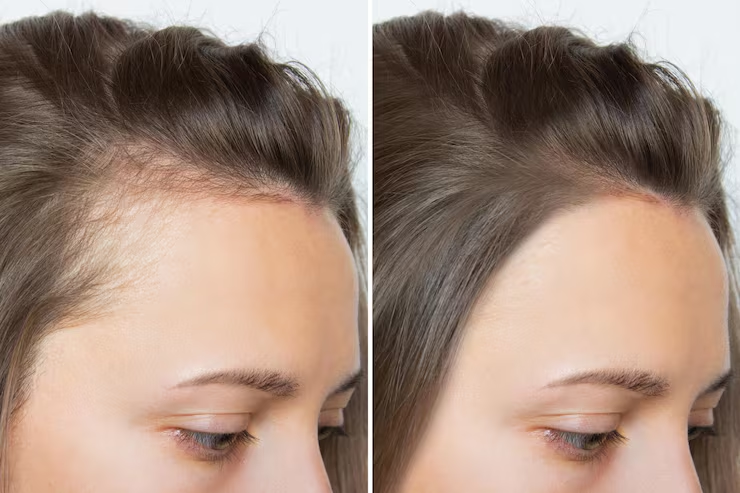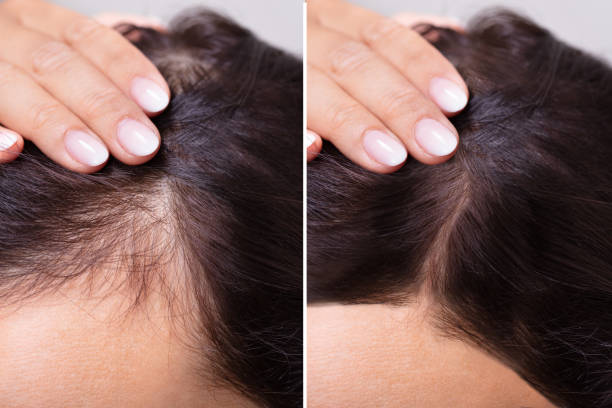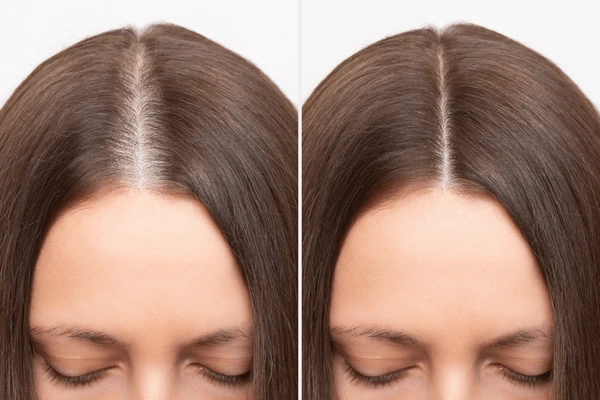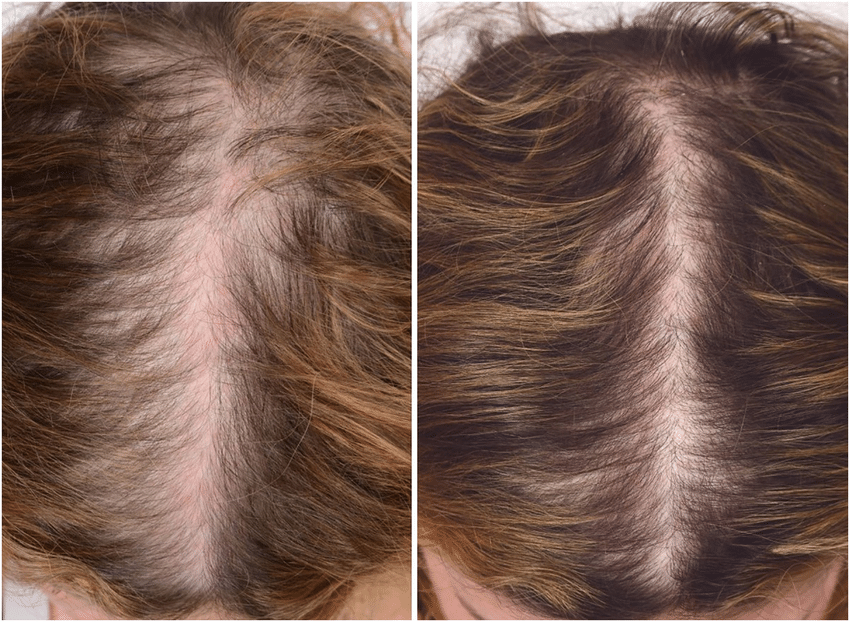HAIR FALL
.jpg)
Need An Appointment?
Drop Your Number here
Common Causes of Hair Fall in Women
-
Hormonal Imbalance:
Fluctuations in hormones, especially estrogen and progesterone, can lead to excessive hair shedding. This commonly happens during pregnancy, postpartum, or menopause. -
Genetics (Female Pattern Baldness):
Hereditary hair loss, also known as androgenetic alopecia, is one of the most common causes of hair thinning in women. It typically results in thinning on the crown and along the hair parting rather than total baldness. -
Stress:
Physical or emotional stress can trigger telogen effluvium, a temporary form of hair loss where more hair enters the shedding phase. -
Nutritional Deficiencies:
Deficiency of iron, vitamin D, biotin, zinc, and protein can weaken hair follicles and slow down hair growth. -
Thyroid Disorders:
Both hypothyroidism and hyperthyroidism can disrupt hair growth and lead to thinning. -
Polycystic Ovary Syndrome (PCOS):
Women with PCOS often experience hormonal imbalance, which leads to excess androgen production, causing hair thinning on the scalp and unwanted hair growth on the face or body. -
Postpartum Hair Fall:
Many women experience heavy hair fall 3–6 months after childbirth due to sudden hormonal shifts. This condition is temporary and usually resolves within a year. -
Hairstyling and Chemical Treatments:
Frequent use of heat styling tools, tight hairstyles, or chemical treatments like straightening, coloring, or perming can damage hair shafts and cause breakage. -
Medical Conditions and Medications:
Autoimmune diseases like alopecia areata, or medications for blood pressure, depression, and birth control can also contribute to hair loss.
Effective Treatments for Hair Fall in Women
Treatment depends on the cause and severity of hair loss. Modern dermatology offers several effective options:
1. Topical Treatments
-
Minoxidil (2% or 5%): A clinically approved solution that stimulates hair follicles and promotes regrowth.
-
Hair Growth Serums with peptides, vitamins, and natural extracts can also help strengthen hair.
2. Oral Medications
-
Anti-androgen medications like Spironolactone help reduce hormonal hair loss.
-
Nutritional supplements containing Biotin, Iron, Zinc, and Omega-3 fatty acids improve hair health.
3. PRP (Platelet-Rich Plasma) Therapy
PRP is a non-surgical treatment where platelet-rich plasma from your own blood is injected into the scalp. It stimulates dormant hair follicles and improves hair thickness and growth.
4. Mesotherapy
Involves microinjections of vitamins, amino acids, and growth factors into the scalp to nourish and strengthen hair follicles.
5. Low-Level Laser Therapy (LLLT)
Laser light stimulates cell activity in hair follicles, promoting regrowth and reducing hair fall.
6. Hair Transplant Surgery
For advanced cases of hair loss, hair transplantation offers a permanent solution by relocating healthy hair follicles to thinning areas.
.jpg)
Symptoms of Hair Fall in Women
Hair fall in women can appear in several ways, depending on the cause. Common signs include:
-
Gradual thinning on the crown or part line
-
Increased hair shedding while washing or brushing
-
Widening hair part
-
Noticeable hair loss on the scalp or temples
-
Reduced hair volume and ponytail thickness
In some cases, hair loss may be accompanied by itching, dandruff, or scalp inflammation, which require medical attention.
Need An Appointment?
Drop Your Number here
Home Remedies and Lifestyle Tips
-
Eat a balanced diet rich in protein, vitamins, and iron.
-
Massage your scalp regularly to improve blood circulation.
-
Avoid excessive heat styling and harsh chemicals.
-
Use mild, sulfate-free shampoos and conditioners.
-
Manage stress through yoga, meditation, or exercise.
-
Keep hair clean and hydrated with regular oiling.
When to Consult a Dermatologist
You should see a dermatologist if:
-
Hair loss lasts longer than 3 months.
-
You notice bald patches or severe thinning.
-
Over-the-counter treatments are not effective.
-
There is scalp itching, redness, or pain.
Early intervention can significantly improve results and prevent permanent hair loss.
Conclusion
Hair fall in women is a common but treatable condition. With accurate diagnosis, medical treatments, and healthy lifestyle habits, it’s possible to control hair fall and restore thicker, stronger hair.
If you’re experiencing excessive hair loss, consult a qualified dermatologist or trichologist for personalized treatment. Remember — early action can make all the difference in regaining your hair health and confidence.
Patient's Testimonials




Reviews & Treatment Results at Bansal Skin Solution

5.0
(600 Reviews)

5.0
(500 Votes)

5.0
(567 Votes)
She's the best skin doctor I've come across so far. she listens patiently, gives the prominent treatment accordingly. Guys looking for skin treatment must visit Dr Nidhi Bansal, you will get satisfying results👍

Ravi Bhardwaj
PatientI consulted with Dr Nidhi Bansal after one of my friend suggested. The doctor is very calm and well versed with the solutions. I definitely liked the way He made me understand the issues of my hair sclap. I am very happy with my own experience with her and the treatment provided amazing hence I would highly recommend to this doctor for any skin or hair disease.

Manish Pal
PatientI was suffering from severe acne on my face. Dr Nidhi told me in detail about the treatment options and customized the procedures for my face. Within one day my redness and acne has reduced by 90%. I am so happy with the results and would recommend Dr Nidhi to everyone for their skin and hair problems.

Kartikey Singh
PatientBest doctor I always go to Dr Nidhi skin clinic whenever i have any skin problems . Dr. Nidhi is such a humble + trusted doctor I was dealing with pimples and scars from 6 years, someone told me about Dr Nidhi .I having been taking treatment from 2 months .my acne has gone for forever ,thanks for giving me normal skin best dermatologist in jaipur I got 100 % results , M bhut jayda preshan tha acne , blackheads whiteheads se ,mera face bhut khrab dikhta tha bhut guilty feel hota tha logo ko face krne m now I m confident .thank you doctor






